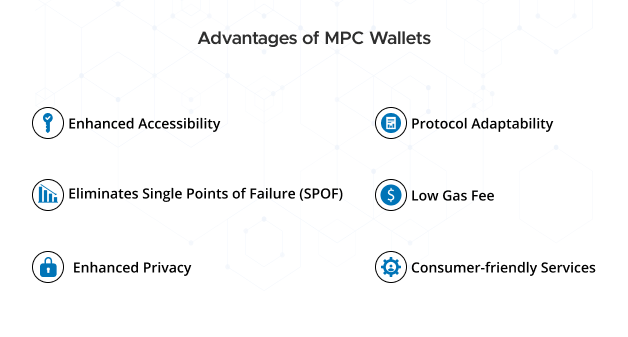-
A multi-party computation (MPC) wallet is a wallet that utilizes MPC protocols to enhance the security and privacy of cryptocurrency transactions. MPC wallet development uses advanced cryptographic techniques instead of a single private key. It protects the private key by storing it in multiple locations. Businesses can opt for MPC crypto wallet development to enhance the security features in their crypto wallets.
This article will explain about MPC wallet, its importance, working, advantages, and more.
MPC Wallet Technology
MPC, or Multi-Party Computation, is a cryptographic technique that enables secure and private computation of sensitive data. Additionally, this technology does not expose the data to any single party. An MPC wallet, therefore, refers to a wallet that utilizes MPC protocols to enhance the security and privacy of cryptocurrency transactions.
You May Also Like | How to Create a Crypto Wallet | A Comprehensive Guide
The Need for MPC Wallet
The need for MPC wallets stems from the requirement to enhance the security of cryptocurrency assets. These wallets reduce reliance on a single point of failure.
By distributing the private key among multiple participants, MPC wallets mitigate the risk of unauthorized access, hacking, or theft. They provide a more robust and secure approach to cryptocurrency management.
Suggested Read | Shifting Towards Web3 Crypto Wallet Development
The Working of MPC Wallet
In general, MPC wallets operate in the following phases:
- Key Generation: Private key generation uses a secure random number generator during the wallet set-up. Then the system divides a private key into multiple shares using cryptographic techniques such as Shamir's Secret Sharing.
- Share Distribution: The system distributes the shares among different devices or parties, often referred to as "participants" in the MPC protocol. Each participant holds a percentage of the private key but does not have access to the full key.
- Secure Computation: When executing a transaction, participants collaboratively perform secure computations using cryptographic protocols. The protocols ensure that the participants work together to produce the desired outcome without exposing their individual shares.
- Trustless Reconstruction: The MPC protocol enables the participants to reconstruct the private key securely without revealing their individual shares. Then, one can use the reconstructed private key to sign the transaction without any participant having full knowledge of the key.
Check It Out | Distinctive Features for Solana Wallet Development
Advantages of MPC Wallets

From enhanced accessibility to low transaction charges, MPC wallet development offers the following MPC wallets:
Enhanced Accessibility
These wallets enable various parties to handle assets jointly. It makes it easier for organizations to access and trade virtual assets.
Eliminates Single Points of Failure (SPOF)
MPC crypto wallets do not store their private keys in one place. So, there is no chance of single points of failure (SPOF).
Enhanced Privacy
MPC wallets provide a higher privacy level as compared to standard wallets. By distributing the computation across multiple parties, they prevent any single participant from learning the complete transaction details or private key. It protects the user's financial privacy and reduces the risk of sensitive information exposure.
Also, Read | What Can Blockchain Do For Digital Asset Management
Protocol Adaptability
MPC crypto wallets can sustain various blockchain protocols. It enables wallet providers to support new crypto assets and chains.
Low Gas Fees
The number of blockchain processes necessary to complete a transaction determines the gas charges. MPC wallets are cost-effective since they charge lower fees than a standard blockchain transaction, no matter the number of signers.
Consumer-friendly Services
MPC wallet solutions offer its users the accessibility to web3 ecosystem. It may include the selling and buying of non-fungible tokens (NFTs) on famous NFT marketplaces.
Also, Visit | NFT Wallet Development | Essential Aspects to Consider
MPC Wallet Development
Developing an MPC (Multi-Party Computation) wallet involves several key steps. It starts with planning and requirement gathering to determine the goals, features, and security requirements.
Then subject-matter experts design the architecture. They outline the components and their interactions, including key generation, share distribution, secure computation, and blockchain integration.
Subsequently, developers select a suitable cryptographic protocol, such as Shamir's Secret Sharing or threshold cryptography. The key generation process generates a secure private key, which is then split into shares using the chosen cryptographic protocol.
Secure distribution of shares among participants is crucial. The secure computation phase allows participants to collaborate without revealing their individual shares. It enables the generation of cryptographic signatures or reconstruction of the private key when needed.
Throughout the development process, security measures, testing, and user interface design are important considerations. Regular maintenance and updates are necessary to ensure the wallet's performance, security, and compatibility with blockchain networks.
All the above processes require expertise in development and design. Businesses can take assistance from a blockchain development company like Oodles.
Explore More | Developing an Advanced DeFi (Decentralized Finance) Wallet
MPC Wallet Use Cases
The following are the MPC wallet use cases:
Escrow Service
MPC wallets can enable secure escrow services by allowing parties to hold private key shares. This ensures that transactions are only executed when all specified conditions are met.
Exchanges and Custodial Services
MPC wallets offer exchanges and custodial services an opportunity to enhance their security measures. By utilizing MPC technology, these services can distribute the private keys associated with user assets.
It reduces the vulnerability of having a single point of failure. This ensures that the security of user assets is strengthened and protected against potential risks.
Investment Clubs and Consortium
MPC wallets empower groups of investors to jointly manage their investments in multi-user wallets for investment clubs or consortiums. With the help of MPC technology, these wallets enable investors to actively make decisions together and enforce consensus before executing transactions.
Organizations, DAOs, and Companies
MPC wallets provide a secure solution for decentralized organizations, companies, and project teams to collectively manage their assets and approve transactions. By enabling secure collaboration and decision-making, multiple stakeholders can jointly oversee the wallet's operations.
Suggested Post | DAO (Decentralized Autonomous Organization) Development
Conclusion
MPC wallets enhance cryptocurrency security and efficiency by enabling secure collaboration and decision-making among multiple stakeholders. They protect against single points of failure, making them valuable for decentralized organizations, investment clubs, exchanges, and custodial services. By leveraging cryptographic protocols and distributed computing, MPC wallets offer robust protection for private keys and user assets.
Interested in developing an MPC wallet? Connect with our wallet developers to get started today.

Our Offices
INDIA
Emaar Digital Greens, Sector 61,
Gurugram, Haryana
122011.
Welldone Tech Park,
Sector 48, Sohna road,
Gurugram, Haryana
122018.














